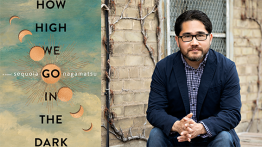How High We Go in the Dark
Thursday, September 29, 2022, 5 - 6pm

Novelist Sequoia Nagamatsu will be in conversation with Nada Ayad, Associate Dean of HSS, as part of an online lecture series around the theme of intersectional justice. Nagamatsu's How High We Go in the Dark is one of the most celebrated debuts of the year, a spellbinding and profoundly prescient novel for readers of Cloud Atlas, Lincoln in the Bardo, and Station Eleven. It was shortlisted for the Waterstones Debut Fiction Prize and the Ursula K. Le Guin Fiction Prize.
From funerary skyscrapers to hotels for the dead to interstellar starships, Nagamatsu takes readers on a wildly original and compassionate journey, spanning continents, centuries, and even celestial bodies to tell a story about the resilience of the human spirit, our infinite capacity to dream, and the connective threads that tie us all together in the universe. In Nagamatsu’s words, How High We Go in the Dark is “a book that reaches for a beating heart somewhere deep in the cosmos.”
Registration for this Zoom event is required. Click here to register.
Sequoia Nagamatsu is a Japanese-American writer and managing editor of Psychopomp Magazine, an online quarterly dedicated to innovative prose. Originally from Hawaii and the San Francisco Bay Area, he holds an M.F.A. in creative writing from Southern Illinois University and a B.A. in anthropology from Grinnell College. His work has appeared in such publications as Conjunctions, The Southern Review, ZYZZYVA, Fairy Tale Review, and Tin House. He is the author of the award winning short story collection Where We Go When All We Were Is Gone and teaches creative writing at St. Olaf College and the Rainier Writing Workshop Low-Residency MFA program.
This series is co-organized by the Office of Student Affairs and Nada Ayad, Associate Dean of HSS, as a continuation of a reading and discussion series for first-year students that was held as part of the Fall 2020 new student orientation. In the spirit of The Cooper Union mission, the Black Student Union and the Cooper Climate Coalition, along with several other Cooper students and faculty, were deeply involved in the articulation of the program as well as in contributing to the reading list and suggesting speakers.




